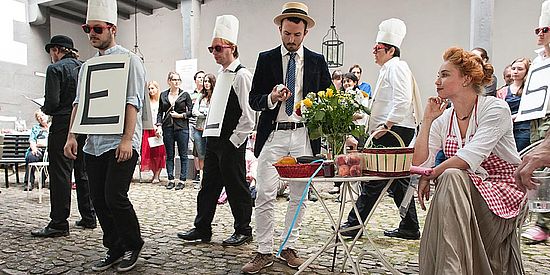

When you study English, the whole world opens up to you: English is now more widely spoken than any other language, and plays a vital role in international communication – especially in business and science. Anglophone culture also pervades daily life through movies, music, advertising, and the media. The academic study of English deals with the contemporary range of the language and the English-speaking world from linguistic, literary, and socio-cultural perspectives, while also addressing its long history. This approach promotes a clearer understanding of cultural change at the global and local level, and of the social and political challenges arising from the status of English as the world’s most important lingua franca. At the University of Basel, we address this spectrum of issues through a strong cultural and interdisciplinary approach based on courses in literary studies, linguistics, and language education.
At the University of Basel’s English Department, research and teaching take place in two academic subfields:Literary Studies and Linguistics.
The subfield Anglophone Literary Studies takes an interdisciplinary approach based on cultural studies to address anglophone literature in the context of intellectual and cultural history, as well as in connection with other media. Anglophone Literary and Cultural Studies in Basel focus on the following points:
The subfield Linguistics of English studies the significance and functions of the English language in the past and present, in public and private, in culture and science, and of course in everyday life. Anglophone linguistics in Basel has the following focal points:
At bachelor level, the curriculum introduces students to the complex field of English language(s), literatures, and cultures, andto the theories and methods of linguistics, literary studies, and cultural studies. Students develop an understanding of English and the associated phenomena from a social, cultural, historical, and cognitive perspective. In addition, an essential component of the curriculum is the acquisition of excellent language skills, particularly for academic contexts (both written and oral).
Almost all courses at the English Department are taught in English.
| Degree | BA in Englisch |
| Type | Degree subject |
| Start date | September |
| Credit points | 180 |
| Study structure | The bachelor's degree is the first degree. It comprises a total of 180 credit points (CP). English is studied as one of two degree subjects, each worth 75 CP. In addition, there are free electives (30 CP). One ECTS credit point corresponds to approximately 30 hours of work. |
| Subject combination | In addition to subjects from the Faculty of Humanities and Social Sciences, a second bachelor's degree subject can also be an extra-faculty subject. The free electives are at the free provision of all students. It is generally used to acquire general skills (foreign languages, IT, rhetoric, etc.), interdisciplinary learning (non-subject or interdisciplinary courses), further deepening of one's own subject studies or the acquisition of a certificate. |
| Language of instruction | English |
| Subject area | Anglophone Linguistics and Literary Studies |
The Student Administration Office at the University of Basel is responsible for admitting students to bachelor’s programs in the Faculty of Humanities and Social Sciences. This is based on the admission regulations of the President’s Office:
Holders of a Swiss federal Maturität certificate will be admitted to all bachelor’s degree programs.
If you have any further questions, please consult the information provided here.
Students must register for their bachelor’s or master’s degree program within a specified timeframe – even in cases of delayed registration.
The University of Basel organizes regular information events for bachelor’s and master’s programs. Details can be found on the events page of the Faculty of Humanities and Social Sciences.
Some subject areas also offer their own separate information or welcome events. Please consult the page for the relevant subject area for event dates and locations.
Students who have earned 60 CP in the subject to be examined or 120 CP in the degree program and have completed the seminar papers that count towards the degree in the subject to be examined or in the degree program may register for the Bachelor's examination. Proof is provided by submitting the module assignment.
Only one subject per session can now be examined. This means that the two Bachelor's examinations can be spread over two sessions (note: only for subjects - it is not possible to separate the two examinations for degree programs).
BA examinations: Due to the free availability of AI text generators (such as ChatGPT), the Faculty of Phil.-Hist. has decided to adapt the way in which the BA examination is conducted. This adjustment is intended to ensure that students are able to do their own work. From spring semester 2023, the BA examinations will once again be written in the university rooms under supervision. These will be digital "bring-your-own-device" examinations. The examination dates remain unchanged.
Please note the updated information sheet on the procedure for BA examinations and the new registration form (subject, degree program). If you have any questions, please contact the Student Administration.
After completing a bachelor’s degree in English, students may study toward a master’s in English (in combination with a second major). We also offer the interdisciplinary Master’s Degree Program in Language and Communication, and the multilingual Master’s DegreeProgram in Literary Studies, both of which are studied without a second major.
Graduates who are interested in the teaching profession can study for a teaching diploma for the lower secondary level (Sekundarstufe I) or upper secondary level (Sekundarstufe II). For details and teaching diploma regulations, please consult the relevant school for teacher education (such as the FHNW School of Education) or the Swiss Conference of Cantonal Ministers of Education.